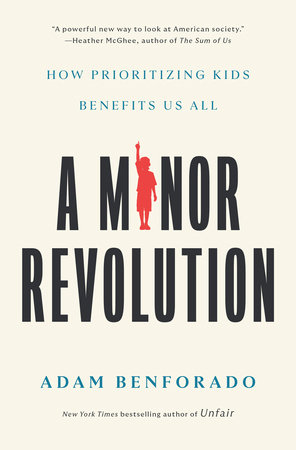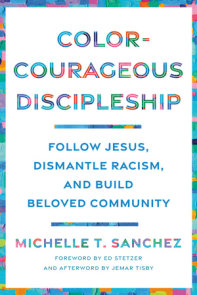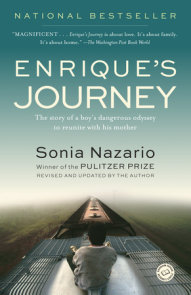READERS GUIDE
One of my major aspirations in writing A Minor Revolution was to get people talking about children’s rights. A core provision of the U.N. Convention on the Rights of the Child is an obligation to make children’s rights “widely known” because until we view children as full members of society, worthy of protection, invest- ment, and voice, we cannot make real progress on advancing their interests. But, today, in the United States—and in most of the world—children still tend to be seen as only potential or partial citizens. And frequently we don’t even consider how our actions—our laws, our products, our individual choices— impact kids.Having read the book, my challenge to you now is to help spark a new mindset by discussing children’s rights with your kids, your parents, your neighbors, your friends, and your coworkers. Don’t expect to agree on everything. That’s not the point. My aim isn’t to convince everyone to share my exact perspective on what is best for kids; it’s to get everyone thinking about what is best for kids. That can begin with a casual chat. How do you feel about a fifteen-year-old voting? Should a parent have a right to know what books their kid checks out from the public library? Do you think college should be free?
Here are my top questions to get the conversation started over the dinner table or in your book club. But if you want to go into more depth, I recommend consulting the free Freshman Year Reading / Common Reading Guide, which has more than 100 questions organized by chapter, along with writing prompts, activism ideas, and other materials. Finally, I encourage you to visit my website, adambenforado.com, and join the AMR mailing list to keep in touch. I am excited to continue the march for children’s rights alongside you.
Introduction
Advances in psychology, neuroscience, sociology, and public health have provided us with an ability unparalleled in human history to understand and protect children. But we have not seized the moment. This is a moral problem but it’s also an economic and social one: by failing our children today, we doom ourselves in the years ahead. The root cause of nearly every major challenge we face—from crime to poor health to poverty—can be found in our mistreatment of children. But in that sobering truth is also the key to changing our fate as a nation. We must reform our world—our institutions, our laws, our business practices, our parenting—to put children first.Questions and Topics for Discussion
1. In the book, Benforado identifies six core rights that all children possess: (1) the right to attachment, (2) the right to investment, (3) the right to community, (4) the right to be a kid, (5) the right to be heard, and (6) the right to start fresh. Which do you think is most important and which do you think is least important? Benforado acknowledges that, while he believes that these six rights are vital, “they aren’t the only ones that matter” and that he “hope[s] the book will prompt you to consider your own list.” What additional children’s rights do you think society should prioritize?
2. In the opening pages, Benforado argues, “What children are due is not sufficiency—nor even equality—it is prioritizing. When genuine conflicts arise, the default should be to privilege their rights over the rights of others.” After reading the book, do you agree?
3. Thinking back on your own childhood, what are the most vivid memories you have of moments when your rights were not respected? Has your perspective changed on those incidents over time? How do you think matters might have been handled differently to honor your rights?
4. In Chapter 1, Benforado provides a stark portrait of the negative impact of parental incarceration on children. What do you think of his proposal to eliminate incarceration for most parents who have com- mitted crimes (where the parents do not present an ongoing threat to society, including their kids)?
5. Chapter 2 opens with a question, “When did you first notice the gap between rich and poor?” How did you think of your own circumstances growing up? Were you aware of ways in which your family’s economic situation was holding you back or lifting you up? Do you believe in the American dream?
6. Do you think recognizing and prioritizing children’s rights will make things better or worse for parents?
7. Do you think a 10-year-old is a “full person” or is a person not “whole” until they “grow up”?
8. Do you remember any instances from your childhood where your parents treated you as if you were their property? If so, was that ownership mentality reflected in actions they took toward you or things that they said? How did this treatment make you feel?
9. Do you think children should have a right to privacy? If so, at what age and in what ways?
10. At the beginning of Chapter 4, Benforado asks, “When is a child an adult?” What is your answer? Did it change after finishing the book?
11. In Chapter 4, Benforado argues that “we end up protecting [kids] from the wrong things—swear words, country mud, library books—while leaving them exposed to significant dangers: pollution, guns, bullying.” Do you agree with that assessment? What would you add to the list of overhyped dangers? What would you add to the list of overlooked dangers?
12. At what age do you think a person should be allowed to vote for president? How do you think govern- ment policy would be different if people younger than eighteen were permitted to vote?
13. How much power should children have in decision-making at home? Should they get to weigh in on what’s for dinner, where to go on vacation, and whether to add another member to the family?
14. In Chapter 6, Benforado explores the problems with a system of higher education that requires many students to take on high debt loads prior to getting their first job. Would you be in favor of reforms that made college free for all students? If so, how would you pay for it?
15. At the end of Chapter 6, Benforado writes, “We ought to care more about the interests of the living than the interests of the dead. We ought to privilege the autonomy of the generations to come over the autonomy of those departed.” Do you agree? How much should a person be able to control their property after they die?
16. In Chapter 7, Benforado argues that “Kids are canaries in our coal mines. The things that harm kids also tend to harm adults, but kids are more sensitive to the bad effects.” Can you think of examples of where making kids our primary focus would encourage us to “intervene earlier and more completely” with “major benefits for everyone”?
17. The topic of race comes up in many of the chapters. As you look back over the book, do you see a consistent pattern when it comes to the disparate treatment of black children? What reforms do you think would make the biggest difference in addressing racial inequalities? Do you favor broad solutions or targeted ones aimed specifically at policing, the child welfare system, socioeconomic mobility, housing discrimination, and the like?
18. To overcome inertia and outright resistance to advancing children’s rights, do you support the creation of a broad movement focused on all children or do you think it is best to focus on the interests of particular groups of children: girls, trans kids, native American youth, autistic children, etc.? Do you think it would be wise for the United States to have a Children First political party? Why or why not?
19. What do you think of Benforado’s idea to replace “originalism—asking what reasonable people living in the eighteenth century would have thought the text [of the Constitution] meant” with asking “what the words ought to mean in light of the best interests of children”?
20. Do you think we should add a “Children’s Bill of Rights” to the Constitution? If so, what provisions would you include?
21. In Chapter 8, Benforado asks, “What if we required a child-impact assessment each time [the government] considered a proposed regulation, law, or zoning change?” Do you think that would be effective in ensuring children’s welfare?
22. At the end of Chapter 8, Benforado advocates for the creation of single, independent agency focused on the “whole child” that would “centralize the bulk of child-centered government activity.” Do you agree that that would be more effective at ensuring the well-being of children than the current siloed approach, where different agencies each handle discrete issues that impact children? What are your concerns with creating such an agency?
23. What was your favorite story in the book? Why did it resonate with you?
24. After finishing the book, do you feel motivated to make any changes in your life, your local community, or the boarder world? If so, what steps do you plan to take?






















